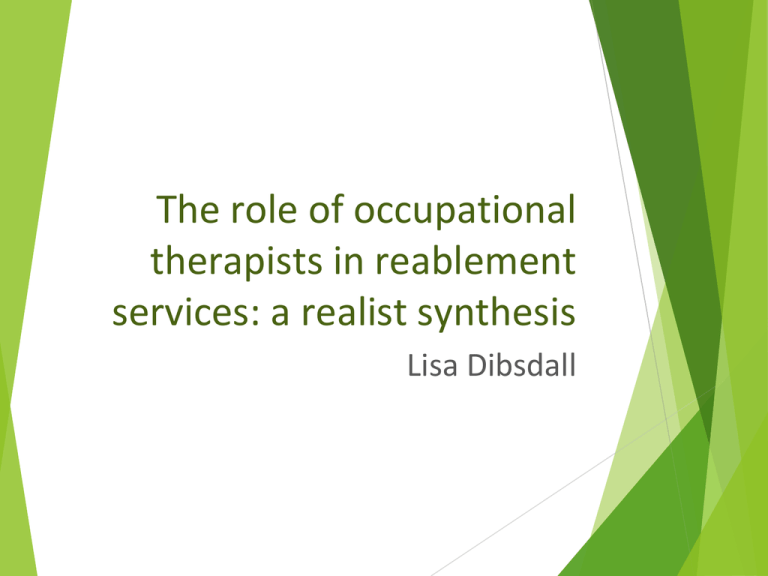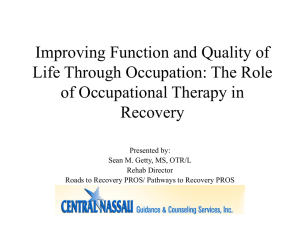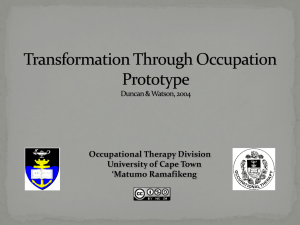The role of occupational therapists in reablement services: a realist
advertisement

The role of occupational therapists in reablement services: a realist synthesis Lisa Dibsdall Today.. Overview of my realist synthesis Definitions Mapping the territory Literature search strategy Identifying context mechanism outcome configurations Second search of the literature Findings and conclusions Reflections on the process Where I’m coming from PhD Student – part time An occupational therapist Interested in my topic Self funded New to realist approaches Starting point Reablement ➢‘services for people with poor physical or mental health to help them accommodate their illness by learning or re-learning the skills necessary for daily living’ ➢Developed following government focus on personalisation and preventative services Occupational Therapists ➢Support people to complete the occupations that are important to them ➢Educated in how physical and psychological disabilities affect engagement in occupations. ➢Trained in rehabilitation techniques Reablement and Occupational Therapists No blueprint for the delivery of reablement services Service embedded in a complex social system Little research on occupational therapists in reablement services. How occupational therapists work in reablement and what influences their effectiveness ‘what works for whom in what circumstances and why?’ Mapping the territory Who are my stakeholders? Using experts in the field Professional networks Publications from College of Occupational Therapists Identifying possible programme theories Identifying possible programme theories Research Question How do configurations of occupational therapy practice in reablement and their underlying mechanisms influence best outcomes for service users and reablement teams? Initial literature search Terms for reablement enablement, restorative care, rehabilitation Terms for adult social care 147,000 results Searched for adult social care and occupational therap* Exclusion criteria - iterative process Identifying contexts mechanisms and outcomes Screened 2297 articles appraised full text of 190 articles Individual appraisal sheets context mechanism outcome configurations If...then statements If occupational therapists are available for informal and formal supervision and training of support workers [context] and support workers have confidence in the ethos of reablement [mechanism] and are open to changes in their practice [mechanism] then support workers are effective enablers [outcome] If...then statements If service users have quick access to occupational therapists to assess for and provide equipment and/or adaptations [context] and service users accept using equipment or adaptations [mechanism] then service users are able to complete daily living tasks more easily [outcome] and quality of life improves [outcome] Second review of the literature Search for evidence of theory. Broadened search out from reablement Focus on occupational therapists working with service users in the community Training support workers Provision of equipment and adaptations Goal setting Second review of the literature - another table Training and supervision of support workers Need for a change in culture from ‘doing to’ a person Staff retraining is ‘crucial’ particularly for those from traditional home care settings. Greater training and supervision leads to increased job satisfaction Occupational therapists have knowledge and experience to train support workers. Occupational therapists currently have a greater role in informal training and support leading to increased skills for support workers. Provision of equipment and adaptations Provision of equipment and adaptations can increase independence for service users and prevent or delay admission to care homes. Equipment is acceptable to most people and still used over a period of time Quick access to an occupational therapist is more important that having an occupational therapist within the team Delayed access to occupational therapists leads to bed dependency and prevents new service users joining the reablement service. Delays in provision of equipment is frustrating for service users. Goal setting and reablement planning Occupational therapists complete assessments, identify goals and write reablement plans with service users. Occupational therapists assert that their knowledge of medical conditions enables them to take more risk in designing reablement plans Some managers assert that occupational therapists can work with a medical model approach and be risk averse. Conclusions Some evidence to confirm and refute the programme theories of the conceptual framework Few studies contain significant information on the role of occupational therapists in reablement services. Few occupational therapists were participants in studies of reablement services. Need for further research on the occupational therapists working in reablement services from the perspective of occupational therapists, their managers and reablement support workers. My Research Multiple case study design Three Local Authorities Observation of occupational therapists Interviews with occupational therapists and managers. Focus groups with support workers. Reflections New terminology Realist synthesis helped to identify contexts, mechanisms and outcomes relevant to my topic. This information has guided my case study research. Director of studies has not used realist approaches. It is an iterative process to be presented in a linear format for my thesis Benefit from connection with RAMESES network.











